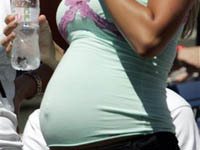Surrogacy may lead to extinction of humanity
Recently, the Chair of the State Duma Committee on Family, Women and Children Elena Mizulina stated that surrogacy could lead to the extinction of humanity. How true is this statement? The Director of the European Centre of Surrogate Motherhood Vladislav Melnikov is convinced that this technology presents no danger for the humanity.

The phenomenon of surrogate motherhood is no longer considered to be exotic for the Russians. These days many cities in the country have centers that help people who due to some biological idiosyncrasies are unable to have children. Surprisingly, many people in Russia have absolutely no idea what surrogacy means. This is the only explanation of the large number of rumors, gossip, and downright false information about this phenomenon in the media.
Perhaps precisely the lack of reliable information has prompted the Chair of the Duma Committee on Family, Women and Children Yelena Mizulina to make a very rash statement about the dangers of this phenomenon both for Russia and for the entire humanity. Mizulina classified surrogacy as a technology that destroys the "natural methods of childbirth." She believes it should be banned along with nuclear weapons as it threatens the extinction of not only Russia, but the entire mankind. However, making such a frightening prognosis, Mizulina has not provided any evidence as to why surrogacy is a threat for the human population.
Interestingly, Mizulina's statement has a strong logical contradiction. It is unclear how the technology contributing to childbirth can lead to the extinction of humanity (which is possible only when no more children are born). Could there be no contradiction? Could the children born to surrogate mothers be sick at birth and sterile, that is, unable to procreate, and those engaged in the development of this technology are simply hiding the awful truth?
The only evidence in support of her statement provided by Mizulina is the fact that the technology is allegedly banned in Europe. She said that the Europeans have already realized the threat and immediately banned women from bearing children of the others. Mizulina has not elaborated on what exactly the European neighbors had realized. The argument is similar to a statement that "If they have it, then we should have it, too." Could that be that European scientists have found something in surrogacy that makes it very dangerous for the society?
The only way to figure this out is to obtain the most detailed and accurate information about the technology. Recently, this information was provided to Pravda.Ru by the director of the European Centre for Surrogate Motherhood Vladislav Melnikov. During the live broadcast "Should Russia allow surrogacy?" he talked about the technology and dispelled many myths about it.
"Let's start by saying that surrogacy has been practiced around the world for a long time, since the late 1980s," said Vladislav Melnikov. "This means that the technology is quite well developed. When a married couple with a disappointing diagnosis of infertility still wants to have a child, they come to a surrogacy center. There a surrogate mother that fits them is chosen. According to the decree by the Ministry of Health, it may be a woman between the ages of 20 and 35 that already has her own healthy child and meets certain medical requirements - in other words, she is healthy.
Once the employees of the center find the right woman, they examine her and conduct psychological tests. The latter is necessary to ensure that the surrogate mother does not claim the unborn child as her own. If there are any doubts about that, the candidate is immediately denied. If everything is fine, the surrogate mother and the biological parents sign a childbearing contract.
Next, both sides go to a medical clinic where they are once again examined, and then sperm is taken from the biological father and an egg from the biological mother. Fertilization takes place in vitro (or, as we say, "in a test tube"). The resulting embryo is grown in vitro for a five-day period, and then it is implanted into the body of the surrogate mother. The implantation technology has been brought to such perfection that the embryo survives in 35 percent of the cases, and these are very good results. If the result is negative, and the embryo does not survive, another surrogate mother is selected.
Well, if the embryo survives, then everything continues according to the standard procedure. The surrogate mother carries a child for nine months, and after the baby is born, the biological parents take it away in allotted time period. Prior to that, in a hospital, according to our law, the surrogate mother gives her voluntary consent to transfer the rights for the child to the child's biological parents. This is necessary for the child's registration.
Obviously, it is completely unacceptable to say that the child is taken away from the surrogate mother. This child is not hers either genetically or legally. It is also a mistake to say that surrogacy is akin to child-trafficking. First, no one is paying the surrogate mother for the mere fact of carrying a child - she is compensated for the temporary disability due to the process (in Russia it is usually from 600 to 750 thousand rubles). And then, as I said, she does not sell her child because the unborn baby is not hers.
Now let's talk about the alleged dangers of this phenomenon. Often, there are statements that surrogate children are not as healthy as their peers born by their biological mother, that there is a high infant mortality among surrogate children, and that they undergo a strong psychological trauma. I have to say that these rumors are totally unfounded because the research indicates otherwise. Children born to surrogate mothers are much more healthy, calm and mentally balanced. Moreover, those who were born in the late 1980s are now adults who have their own families (which denies the allegation of a high percentage of infertility among such children) and all research shows that they are no different from those who were born to biological parents.
There is no evidence to suggest that surrogacy could lead to the extinction of mankind. Quite the contrary, studies show that such pathology as infertility is getting "younger" from year to year. Until recently, the majority of our clientele were 40-year-old couples, and now the services of surrogate mothers are often requested by those in their early thirties. It is possible that over time surrogacy would contribute to the maintenance of human population at a stable level.
One also cannot say that this technology is aimed at satisfying the whims of elderly millionaires. For example, this year alone thousand surrogate children were born in Russia, and 90 percent of their biological parents are people of average income. Data from other countries show the same thing - surrogate mothers are used by the middle class. Moreover, as the technology develops, its cost will go down, and at some point it will be affordable for low-income people.
If we're talking about "foreign countries," a statement that surrogacy is banned in Europe is not quite correct. In fact, it is banned by law in Germany, France and Italy. In other countries such as the UK it is either permitted or not regulated by law (according to the European tradition, something that is not banned is allowed by default). In addition, this technology is allowed in other foreign countries outside of Europe - for example, in the United States and South Africa.
And finally, we should talk about another misunderstanding that surrogacy may prevent the Russians from adopting children from orphanages. Take a careful look at the numbers: last year 117,000 children in orphanages were registered in Russia (this is the total number, from newborns to 17 year-olds). There are five million infertile couples in Russia. That is, even if every such couple adopts a child, there still will be many people who would like to have children. There is no competition here.
Surrogacy has absolutely no threat to anyone. I would advise that Elena Mizulina, instead of making such irresponsible statements, pays closer attention to the gap in the law on surrogacy adopted in 1995. There are two provisions there that require correction. The first one states that if the surrogate mother does not want to give the baby to the biological parents, she has the right to keep it. The second one says that the biological parents also have the right to refuse a child born by a surrogate mother, in which case the child gets to an orphanage.
I believe that both of these provisions are wrong. As I've said before, the surrogate mother has no rights to her unborn child, it's not her child. As for the biological parents, I believe that they should be held responsible for the entire engagement with a surrogate mother. Therefore, they should not be allowed to give up the child, and it should be stipulated by the law. "
As you can see, there are no reasons to be afraid of surrogacy. This technology does not lead to the extinction of humanity, on the contrary, it will be able to help it survive in adverse times that are, unfortunately, very close.
Anton Evseev
Subscribe to Pravda.Ru Telegram channel, Facebook, RSS!




